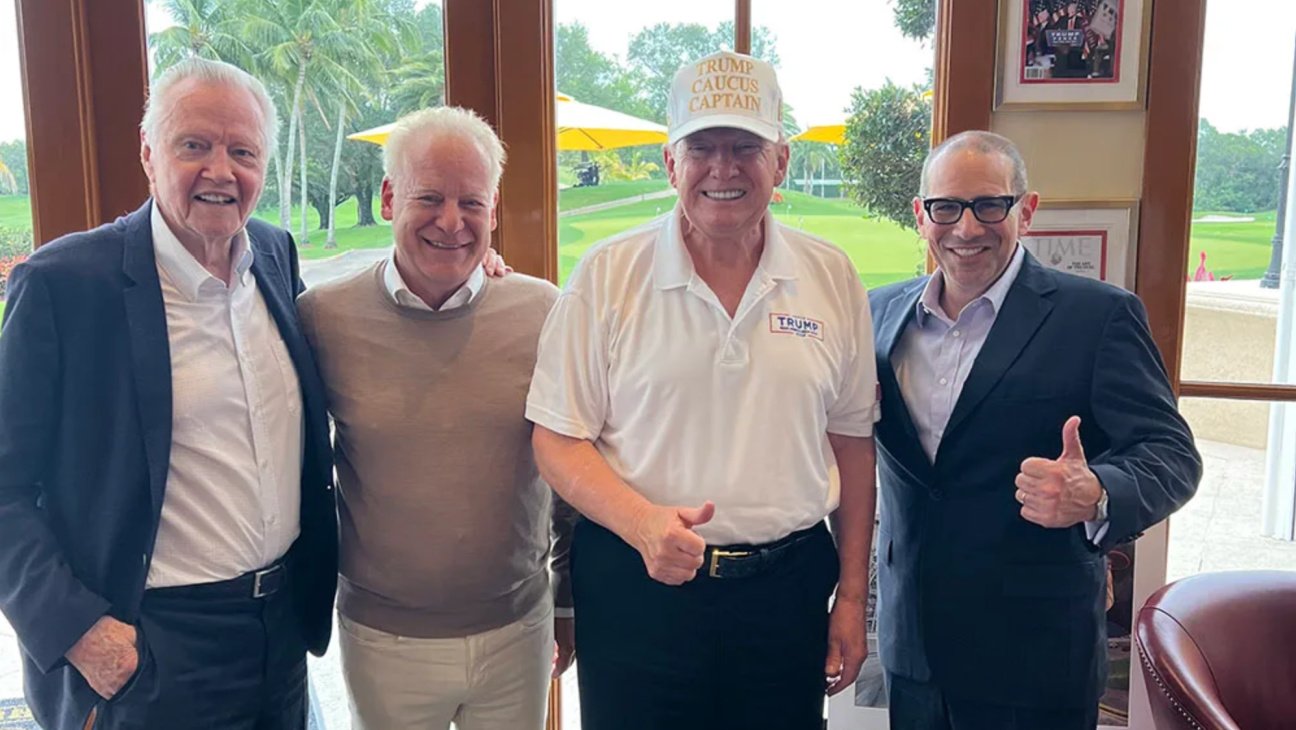Trump’s Man With a Plan in Hollywood Opens Up
The Westwood offices of filmmaker and manager Steven Paul are crowded with mementos of an idiosyncratic journey in the business. On one wall, there is a framed 1971 New Yorker “Talk of the Town” piece that profiles Paul as a 12-year-old actor in a Kurt Vonnegut play and an adolescent playwright himself. On another is…
The Westwood offices of filmmaker and manager Steven Paul are crowded with mementos of an idiosyncratic journey in the business. On one wall, there is a framed 1971 New Yorker “Talk of the Town” piece that profiles Paul as a 12-year-old actor in a Kurt Vonnegut play and an adolescent playwright himself. On another is a Hollywood Reporter story published nine years later about Paul debuting his first major film, Falling in Love Again, starring a young Michelle Pfeiffer. On a coffee table shelf sit stacks of vintage Atlas Comics, the predecessor label to Marvel that Paul bought a majority stake in a few years ago, to the delight of nostalgic comic book bloggers.
Paul’s latest chapter may soon be worthy of its own keepsake. Ever since President Trump named Paul’s client Jon Voight one of three “special ambassadors” to Hollywood in January, alongside fellow 20th century A-listers Sylvester Stallone and Mel Gibson, Paul’s mindset has broadened from Santa Monica Boulevard to Pennsylvania Avenue. As Voight’s longtime manager and business partner, Paul, perhaps best known as one of the minds behind the 1999 comedy Baby Geniuses, has become an unlikely go-between for Hollywood and the White House.
While Stallone and Gibson have been relatively quiet about their presidential appointments, Voight and Paul have jumped into action, energetically embracing the president’s all-caps mandate to bring Hollywood back “BIGGER, BETTER, AND STRONGER THAN EVER BEFORE!”
The pair, along with the president of Paul’s SP Media Group, Scott Karol, have zeroed in on the flight of production from the U.S. to locales with more attractive tax incentives. “It’s gotten worse and worse and worse,” says Paul at his office, located in a building he owns. Downstairs is a cozy coffee shop, Hank’s Cafe, pouring brews from L.A.-area staple Urth Caffé and featuring pictures of Paul’s father (the titular Hank) and other Paul associates, like a clothing designer for Baby Geniuses. “You see people leaving [and] have friends that are leaving town. They just can’t afford it, they’ve taken other jobs.”
This kind of advocacy can sound a little strange coming from a producer whose company has recently produced quite a few nearly star-free action projects in Bulgaria, which offers a 25 percent rebate on production expenses. Still, Paul, Voight and Karol have surprised some leaders in Hollywood with their close attention to the industry’s concerns in their new roles.
After meeting with several industry organizations this year, Paul, Voight and Karol presented a meaty array of ideas — from infrastructure subsidies for theater owners to tax code changes — to Trump at Mar-a-Lago.The President seized on one suggestion, tariffs, and posted on Truth Social about applying them to projects produced abroad before the White House walked that back.
The Voight group also highlighted industry appetite for a federal film tax incentive that could be combined with individual states’ tax credits. It’s an old notion, one that a couple of unions began lobbying for before Trump 2.0, but has gained renewed momentum in an era of America First policy. Industry groups and Voight’s team pushed to include the incentive in Trump’s “Big Beautiful Bill,” but that effort failed.
Now, Hollywood has pinned its hopes on bipartisan legislation to establish the incentive. Though no federal bill has been announced, top industry organizations are having “continued discussions,” Paul says. “We are not stopping until hopefully we accomplish this mission that we have beenon.” Sen. Adam Schiff and Rep. Laura Friedman, both Democrats, are involved in the effort. But the push also has support from the other side of the aisle, according to Karol, who says that further details will be announced at the “appropriate time.”
Still, it’s an open question how much the Trump team — and, by extension, the GOP lawmakers that so carefully toe its line — is invested in supporting the film and TV business. Schiff has been working on federal film tax legislation for some time, but he may be a less-than-ideal spokesperson given his role as a Democrat punching bag for Trump (most recently, the president accused him of mortgagefraud).On a broader level, given Hollywood’s reputation as a bastion for bleeding-heart liberals, is this notion of revitalizing the business a passing fancy? A ploy to gain leverage in order to influence the industry’s storytelling?
The president’s interest in helping Hollywood is genuine, insists Paul. “[Trump] loves the entertainment business, and it’s not a Democrat or Republican business,” he says. Karol argues that the employment the industry provides is highly valued by this White House. “This is about creating high-paying, skilled jobs all throughout America … It’s truck drivers, it’s electricians, it’s construction workers, it’s caterers.”
If a federal film tax incentive is put in place, then international co-production treaties could be on the table, Paul and Karol say. And Voight’s team has other ideas to boost the industry. As independent producers, they’re eager to open discussions with industry unions about low-budget project labor contracts, which they say are too often negotiated by the Alliance of Motion Picture and Television Producers, whose top members companies are major studios and streamers, rather than independent producers on the ground.
Local production woes are also in their sights. Recently, California more than doubled its cap for film and TV tax incentives, to the applause of industry unions. But Karol maintains that California’s cap needs to be “two or three times” its current size and include above-the-line costs as qualified expenditures to truly compete on big-budget projects. He and Paul are championing the passage of a federal bill to extend Sec. 181 of the Internal Revenue Code, which allows projects that shoot in the U.S. to deduct production costs. But they also want to see a similar measure pass in California to lure more production.
Paul now has more skin in the game. In May he revealed his purchase of Van Nuys’ Avenue Six Studios, where he plans on hosting some of his company’s shoots as well as other film and TV productions and some creator content. First up in the new digs? The Last Firefighter, starring his client Voight and Kelsey Grammer, about retired firefighters grappling with their pasts, which is set for release in 2026. “We’ve made a statement that we need to bring production back. So we wanted to be able to make a statement [of] here we are, filming here,” explains Paul.
But that statement — the production also went on-location in El Segundo and Manhattan Beach — didn’t come cheap. Karol estimates that filming the project in Southern California cost the production 33 to 50 percent more than if they had shot in an area that could pass for SoCal.
SP Media Group is planning on shooting some upcoming projects at its L.A.-area studio and some of it in other locations (like a current film that is shooting in the U.K.). Producing in L.A. remains very expensive. But with Avenue Six Studios, Paul says he’s hopeful that he can actually lure foreign productions here, rather than the other way around, with perks like partnerships with equipment and trailer houses and being a permitted facility. Nodding to the 1989 Kevin Costner movie Field of Dreams, he says, “Build it and they will come.”
It’s an optimistic approach, which seems to be how Paul is handling much of his new role. He didn’t plan on becoming one of Hollywood’s domestic production champions with the White House. But now that the opportunity is here, he’s seizing it. Hanging in the elevator that connects his offices to his café downstairs is a quote often attributed to Walt Disney, a staple of inspirational social media posts: “All our dreams can come true, if we have the courage to pursue them.”
This story appeared in the Sept. 10 issue of The Hollywood Reporter magazine.Click here to subscribe.







